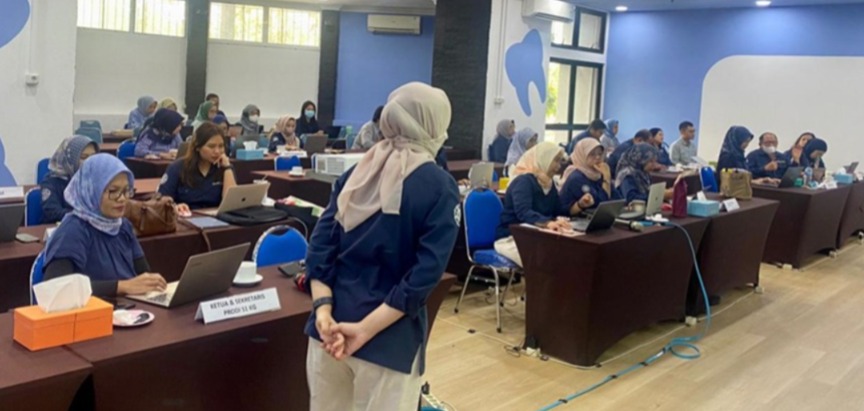The Faculty of Dentistry at Universitas Gadjah Mada (FKG UGM) held a Curriculum Reform Workshop for the 36-credit Professional Dentistry Program, Phase I, on Tuesday and Wednesday, 10-11 September 2024, in the IUP Classroom of FKG UGM.
The workshop was attended by academic leaders from FKG UGM, including Prof. Drg. Supriatno, M.Kes., M.D.Sc., Ph.D., Dr. Drg. Dewi Agustina, M.D.Sc., Dr. Drg. B. Esti Chrismawaty, M.Kes., M.D.Sc., and Drg. Tjut Intan Permata Sari, Sp.PM., representing various departments. Drg. Fimma Naritasari, M.D.Sc., also attended as part of the curriculum team for the Professional Dentistry Program.
The aim of the workshop was to formulate a new curriculum to be implemented in the upcoming academic year, aligning with Article 53 of the Ministry of Education and Culture Regulation No. 53 of 2023 to enhance the quality of education.
In his opening remarks, FKG UGM Dean, Prof. Drg. Suryono, S.H., M.M., Ph.D., emphasized the importance of this curriculum reform to create a higher quality education that meets the needs of the dental profession.
"This curriculum reform is designed to meet the minimum 36-credit learning requirement set forth in the Ministry of Education and Culture regulations, and FKG UGM is committed to being a leader in its implementation," said Prof. Suryono.
The first day of the workshop began with a presentation by Prof. Suryono, followed by Dr. drg. Rosa Amalia, M.Kes., Ph.D., Vice Dean of Academic and Student Affairs at FKG UGM, who discussed the objectives of the curriculum reform and the internship program report.
On the second day, the curriculum team drafted the 36-credit curriculum to be completed in one year. Drg. Tjut Intan Permata Sari, Sp.PM., Head of the Oral Medicine Department’s Professional Training Program at FKG UGM, presented the curriculum draft to the participants.
One of the innovations in the new curriculum is the integration of 2 credits for professional education in the Oral Medicine Department, which will be completed in 13 days, totaling 90 hours of instruction.
This reform is expected to improve the efficiency and quality of learning, better preparing students to face future challenges in the dental profession.
The curriculum reform aligns with the Sustainable Development Goals (SDGs), particularly Goal 4 (Quality Education). By implementing a more efficient and relevant curriculum, FKG UGM is committed to continuously improving the quality of dental education, which is expected to contribute positively to the development of education in Indonesia.
Authors: drg. Tjut Intan Permata Sari, Anjar Arumsari, Pram

